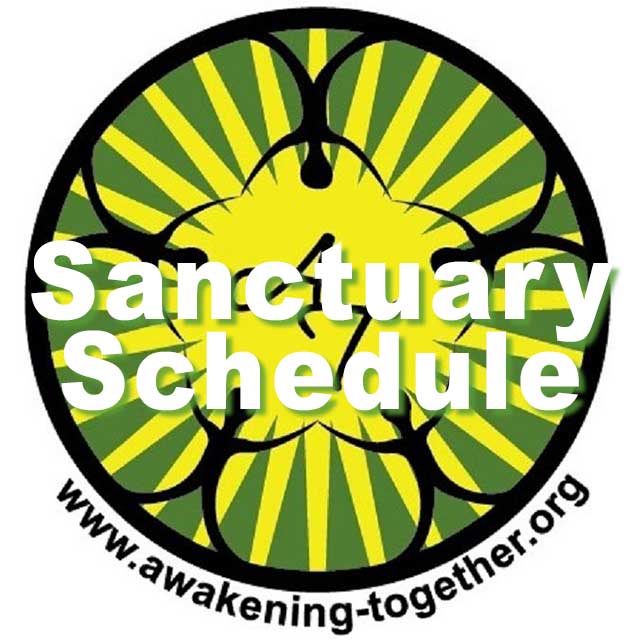Lesson 185. I want the peace of God.
Our current goals:
- Widen the horizons of our vision
- Take direct approaches to uncover the blocks that keep our vision narrow
- Lift those blocks, however briefly, in order to experience the sense of liberation that comes when the blocks are removed
- Intensify our motivation for freedom
Before commenting on today’s workbook lesson, I’d like to say something about the practice we’ve used for the last two days, repeating the Name of God.
There are many things that we do each day that have become well wired into our brains, so that we do not need to pay full attention in order to complete the task. Examples include showering, housework, exercising, and even driving. Because these activities do not require the full attention of our brains, our minds tend to wander a lot when we are busy with these types of activities.
If it feels helpful to you, you can replace mindless mind wandering with the Name of God mantra when you are engaged in activities (or non-activity) that do not require the full attention of your brain. This is not a new assignment for the Gentle Healing Group, but some of you may recognize value in this practice and may want to add it to your other practices. If that’s the case, you may find it helpful to read, “Instructions for Using the Mantra” from The Teachings of Inner Ramana.
Now, let’s look at today’s lesson:
“I want the peace of God. To say these words is nothing. But to mean these words is everything. If you could but mean them for just an instant, there would be no further sorrow possible for you in any form. … To mean you want the peace of God is to renounce all dreams. For no one means these words who wants illusions, and who therefore seeks the means which bring illusions. He has looked on them, and found them wanting. Now he seeks to go beyond them, recognizing that another dream would offer nothing more than all the others.”
“Today devote your practice periods to careful searching of your mind, to find the dreams you cherish still. What do you ask for in the heart? … Consider but what you believe will comfort you, and bring you happiness.”
This is what we are asked to look at today: Do we really want our dreams or do we want the peace of God, which is awakening from dreams entirely? What is it that we truly seek?
It occurs to me that today’s lesson is a lot like the chapter on Unconditional Happiness in Michael Singer’s The Untethered Soul. Having made a commitment to happiness, you don’t trade that for anything. What would you trade it for? As he illustrates in that chapter, we do “trade” our happiness for what we think will bring us happiness. By making the commitment, you get to see what ideas of happiness you are willing to trade your actual happiness for. He uses the example of someone saying, “When I made a commitment to unconditional happiness, I didn’t know my wife was going to die.” There are no conditions on unconditional happiness.
The question is really, what do you value most and why? I value the peace of God most. The concept becomes difficult because we think we know what will bring us peace and happiness. So, when we make the unconditional commitment to the “Peace of God,” we are still focused on the end results. We confuse ends and means.
If you look at your dreams and preferences, ask yourself why the object of your desire is important to you. Isn’t it because you believe that the dream or preference will bring you peace and happiness?
Part of the reason we are still looking at outcomes is because we are seemingly hardwired to believe that our state of mind or our peace of mind is the result of or caused by peaceful outcomes. This is where we have confused cause and effect. Hear this well, “outcomes” do not cause states of mind.
Inner Wisdom told me many months ago that the means and the ends are always the same. In relation to unconditional happiness, it’s obvious that I am making a commitment to being happy no matter the outcome. The same is true of the peace of God. I am making a commitment to rest in the peace of God regardless of outcome–regardless of what I think would result in peace.
I truly do not know what will lead to the peace of God. That is because it is beyond the thinking mind. It is beyond anything that the character can conceive. To be led to peace of mind, I have to surrender. I have to surrender outcomes, or what you might call “dreams.” I have to surrender the desire to manipulate people, places, things, and circumstances in order to “gain” happiness or to gain peace of mind. The peace of God that I seek is inherent in the surrender, not a result of the surrender and certainly not a result of any circumstance.
Regina asked me to use an example of a dream that might need to be surrendered in order to become aware of the state that is the constant peace of God. What comes to mind is the idea of financial security. The thinking mind says, “you feel relatively financially secure, so you can’t use that as an example.” But, a sense of peace regarding my financial security did not come from achieving financial security and then surrendering. It came from surrendering all of those things that I thought that I needed in order to be financially secure.
When I began this journey in earnest, I was making a six figure income and, had I continued on that path, I would have continued to make that income. In fact, I would have retired at full salary and continued to enjoy a six figure income for the rest of my life. When I received the call to leave my career, leaving seemed to threaten my financial security. It seemed to require that I walk away from financial security in order to find the peace of God.
However, what I am experiencing right this moment is financial security-plus. I don’t know what’s going to happen to Awakening Together next year or in the years to come. I don’t know what’s going to happen to Awakening Together when Regina retires. I don’t know that the financial support will continue to be there. However, I do know that there’s nothing that I need to do in order to attain financial security. I understand that financial security is a really just a preference. I understand that my peace and happiness are not dependent on being financially secure. I understand that my true desire is the peace of God. I understand that the only way I can remain in the peace of God is to identify the peace of God as my only goal.
As always, ends and means are always the same. To realize the peace of God, I need merely identify my goals or dreams as intermediaries intended to bring me peace and happiness. In so doing, I see the absurdity of placing these goals before the peace and happiness available in this moment.
Our lesson today says, “No one who truly seeks the peace of God can fail to find it. For he merely asks that he deceive himself no longer …”
We deceive ourselves when we think we want the object or circumstance that we dream of. That isn’t what we want. We want what we think that object or circumstance will bring us. So why dream about an object or circumstance that is an imagined intermediary for what we truly want? Why not ask for what we truly want directly?



